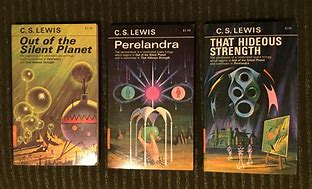Robert Heinlein and James Blish describe scientists making new discoveries. Poul Anderson's characters explore new regions of the universe.
CS Lewis wrote:
"The physical sciences, good and innocent in themselves, had already, even in Ransom's own time, begun to be warped, had been subtly manoeuvred in a certain direction. Despair of objective truth had been increasingly insinuated into the scientists; indifference to it, and a concentration on mere power, had been the result."
-CS Lewis, That Hideous Strength IN Lewis, The Cosmic Trilogy (London, 1990), pp. 349-753 AT CHAPTER 9, p. 560.
"...good and innocent..." is damning with faint praise. "...subtly..." means "demonically."
Elwin Ransom condemns scientific knowledge of the universe as:
"'...the enemy's talk which thrusts my world and my race into a remote corner and gives me a universe with no centre at all, but millions of worlds that lead nowhere or (what is worse) to more and more worlds forever, and comes over me with numbers and empty spaces and repetitions and asks me to bow down before bigness.'"
-CS Lewis, Perelandra IN The Cosmic Trilogy, pp. 145-348 AT 17, p. 339.
The "enemy" is the Devil.
"...Professor Weston...was a man obsessed with the idea which is at this moment circulating all over our planet in obscure works of 'scientifiction', in little Interplanetary Societies and Rocketry Clubs, and between the covers of monstrous magazines, ignored or mocked by the intellectuals, but ready, if ever the power is put into its hands, to open a new chapter of misery for the universe. It is the idea that humanity, having now sufficiently corrupted the planet where it arose, must at all costs contrive to seed itself over a larger area: that the vast astronomical distances, which are God's quarantine regulations, must somehow be overcome. This for a start. But beyond this lies the sweet poison of the false infinite - the wild dream that planet after planet, system after system, in the end galaxy after galaxy, can be forced to sustain, everywhere and for ever, the sort of life which is contained in the loins of our species - a dream begotten by the hatred of death upon the fear of true immortality, fondled in secret by thousands of ignorant men and hundreds who are not ignorant. The destruction or enslavement of other species in the universe, if such there are, is to these minds a welcome corollary."
-Perelandra, 6, p. 216.
When I first read that in my teens, I was a member of the British Interplanetary Society and was reading works by Arthur C. Clarke, Robert Heinlein and Poul Anderson.
In published private correspondence, Lewis referred to the then imminent Moon landing as a desecration. He is worth quoting at length, I think. We recognize obscurantism, "...God's quarantine regulations...," and the opposite of all that we usually appreciate on this blog.

3 comments:
Kaor, Paul!
And I emphatically disagree with Lewis' fears, opinions, and attitudes! God acts thru the universe He created and freely bound Himself to the laws of that universe, as discovered by the scientific method.
And if Elon Musk founds his colony on Mars, then we may see the beginning of that "seeding" so dreaded by Lewis.
Ad astra! Sean
Sean,
Andrea reminded me that astronauts in interplanetary space will be vulnerable to solar flares.
Paul.
Kaor, Paul!
And writers like Robert Zubrin have discussed how best to handle that kind of problem in books like Zubrin's THE CASE FOR MARS.
And I remember how Heinlein handled that in PODKAYNE OF MARS.
Ad astra! Sean
Post a Comment